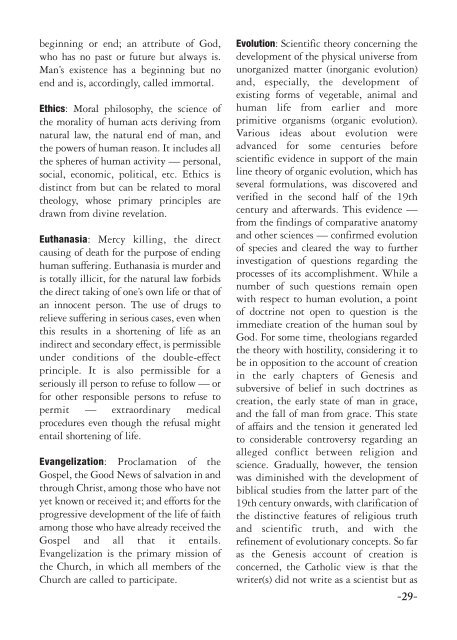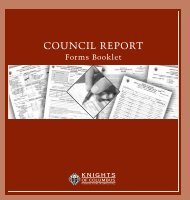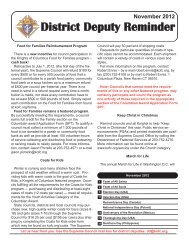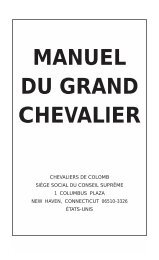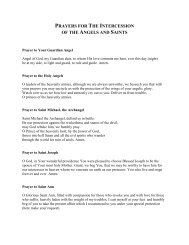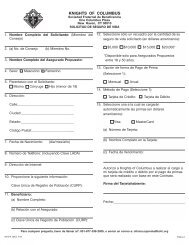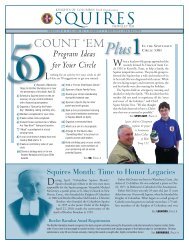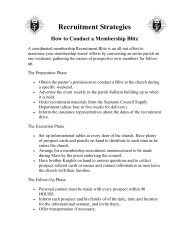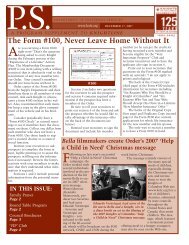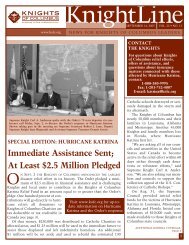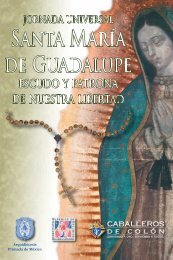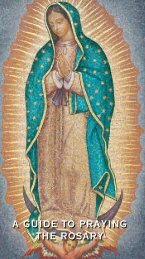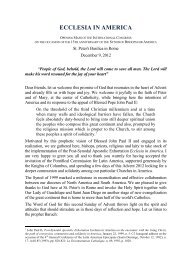CATHOLIC WORD BOOK - Knights of Columbus, Supreme Council
CATHOLIC WORD BOOK - Knights of Columbus, Supreme Council
CATHOLIC WORD BOOK - Knights of Columbus, Supreme Council
You also want an ePaper? Increase the reach of your titles
YUMPU automatically turns print PDFs into web optimized ePapers that Google loves.
eginning or end; an attribute <strong>of</strong> God,<br />
who has no past or future but always is.<br />
Man’s existence has a beginning but no<br />
end and is, accordingly, called immortal.<br />
Ethics: Moral philosophy, the science <strong>of</strong><br />
the morality <strong>of</strong> human acts deriving from<br />
natural law, the natural end <strong>of</strong> man, and<br />
the powers <strong>of</strong> human reason. It includes all<br />
the spheres <strong>of</strong> human activity — personal,<br />
social, economic, political, etc. Ethics is<br />
distinct from but can be related to moral<br />
theology, whose primary principles are<br />
drawn from divine revelation.<br />
Euthanasia: Mercy killing, the direct<br />
causing <strong>of</strong> death for the purpose <strong>of</strong> ending<br />
human suffering. Euthanasia is murder and<br />
is totally illicit, for the natural law forbids<br />
the direct taking <strong>of</strong> one’s own life or that <strong>of</strong><br />
an innocent person. The use <strong>of</strong> drugs to<br />
relieve suffering in serious cases, even when<br />
this results in a shortening <strong>of</strong> life as an<br />
indirect and secondary effect, is permissible<br />
under conditions <strong>of</strong> the double-effect<br />
principle. It is also permissible for a<br />
seriously ill person to refuse to follow — or<br />
for other responsible persons to refuse to<br />
permit — extraordinary medical<br />
procedures even though the refusal might<br />
entail shortening <strong>of</strong> life.<br />
Evangelization: Proclamation <strong>of</strong> the<br />
Gospel, the Good News <strong>of</strong> salvation in and<br />
through Christ, among those who have not<br />
yet known or received it; and efforts for the<br />
progressive development <strong>of</strong> the life <strong>of</strong> faith<br />
among those who have already received the<br />
Gospel and all that it entails.<br />
Evangelization is the primary mission <strong>of</strong><br />
the Church, in which all members <strong>of</strong> the<br />
Church are called to participate.<br />
Evolution: Scientific theory concerning the<br />
development <strong>of</strong> the physical universe from<br />
unorganized matter (inorganic evolution)<br />
and, especially, the development <strong>of</strong><br />
existing forms <strong>of</strong> vegetable, animal and<br />
human life from earlier and more<br />
primitive organisms (organic evolution).<br />
Various ideas about evolution were<br />
advanced for some centuries before<br />
scientific evidence in support <strong>of</strong> the main<br />
line theory <strong>of</strong> organic evolution, which has<br />
several formulations, was discovered and<br />
verified in the second half <strong>of</strong> the 19th<br />
century and afterwards. This evidence —<br />
from the findings <strong>of</strong> comparative anatomy<br />
and other sciences — confirmed evolution<br />
<strong>of</strong> species and cleared the way to further<br />
investigation <strong>of</strong> questions regarding the<br />
processes <strong>of</strong> its accomplishment. While a<br />
number <strong>of</strong> such questions remain open<br />
with respect to human evolution, a point<br />
<strong>of</strong> doctrine not open to question is the<br />
immediate creation <strong>of</strong> the human soul by<br />
God. For some time, theologians regarded<br />
the theory with hostility, considering it to<br />
be in opposition to the account <strong>of</strong> creation<br />
in the early chapters <strong>of</strong> Genesis and<br />
subversive <strong>of</strong> belief in such doctrines as<br />
creation, the early state <strong>of</strong> man in grace,<br />
and the fall <strong>of</strong> man from grace. This state<br />
<strong>of</strong> affairs and the tension it generated led<br />
to considerable controversy regarding an<br />
alleged conflict between religion and<br />
science. Gradually, however, the tension<br />
was diminished with the development <strong>of</strong><br />
biblical studies from the latter part <strong>of</strong> the<br />
19th century onwards, with clarification <strong>of</strong><br />
the distinctive features <strong>of</strong> religious truth<br />
and scientific truth, and with the<br />
refinement <strong>of</strong> evolutionary concepts. So far<br />
as the Genesis account <strong>of</strong> creation is<br />
concerned, the Catholic view is that the<br />
writer(s) did not write as a scientist but as<br />
-29-


